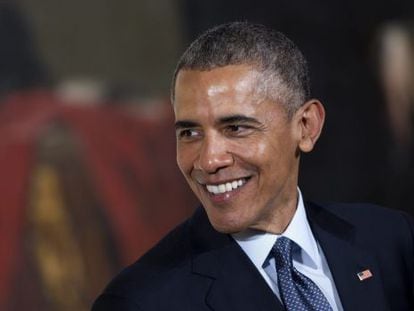US seeks dialogue with Venezuelan government
Washington diplomat travels to Caracas to soothe tension fueled by Obama sanctions

A top US State Department official traveled to Caracas this week to ease tensions with the Venezuelan government, which have been fueled by Washington’s sanctions against members of President Nicolás Maduro’s administration.
Thomas Shannon, a State Department counselor and close advisor to US Secretary of State John Kerry, arrived in Caracas on Tuesday to try to soothe the two countries’ rocky relationship ahead of the Summit of the Americas, which gets underway on Friday in Panama.
The Washington official will try to smooth the rocky relationship ahead of the Summit of the Americas
A State Department spokesman confirmed Shannon’s visit to EL PAÍS.
“Recently, Venezuela invited the government of the United States to send a representative to meet with President Nicolás Maduro,” the spokesman explained.
“His government on numerous occasions has called for a dialogue and we have always made it clear that we want to maintain diplomatic relations and are willing to talk directly.”
Shannon was expected to leave Caracas on Thursday.
There has been much expectation about the State Department official’s visit, especially after two White House advisors in national security and regional issues offered separate clarifications over President Obama’s executive order imposing sanctions on seven Venezuelan officials for human right violations and public corruption.
During a conference call with reporters, Benjamin Rhodes, deputy national security advisor for strategic communications, backed away from the strong language contained in Obama’s March 9 order that described Venezuela as a security threat to the United States.
“The United States does not believe that Venezuela poses any threat to our national security,” he said, explaining that the language in the order is the standard format that is contained in other executive orders of this type.
The description of the Venezuelan government as “a special threat” has been strongly condemned by Caracas-allied Latin American nations and considered exaggerated by some members of the opposition and clergy in Venezuela.
On Friday, Roberta Jacobson, assistant secretary of state for the Western Hemisphere, said she was “disappointed” by the reactions of other regional governments.
“The tone that Latin American leaders are using demonizes the United States as if it were the source of Venezuela’s problems, and this makes it hard for us to proceed pragmatically,” she said.
More than 800 Maduro supporters are expected to travel to Panama to support the Venezuelan leader
“I am disappointed that there were not more countries to defend [the sanctions]. They were not made to harm Venezuelans or the Venezuelan government.”
Political analysts speculated that Shannon’s visit was aimed at heading off a public confrontation at the summit in Panama or stopping Venezuela from stealing the show.
“The summit should be the moment to have a civilized exchange with all the leaders,” said Ricardo Zúñiga, a White House aide on regional issues.
The opposition Caracas daily El Nacional reported that some 825 activists from different political parties that back the government will travel to Panama to support Maduro.
Maduro even started a petition drive to collect 10 million signatures from Venezuela within a month, demanding that Obama’s executive order be revoked.











































